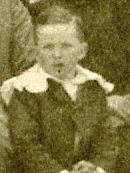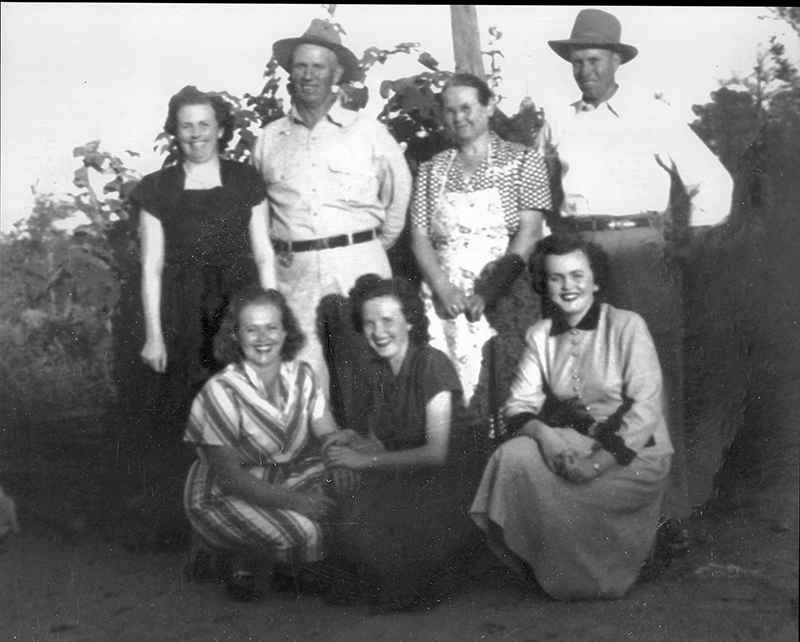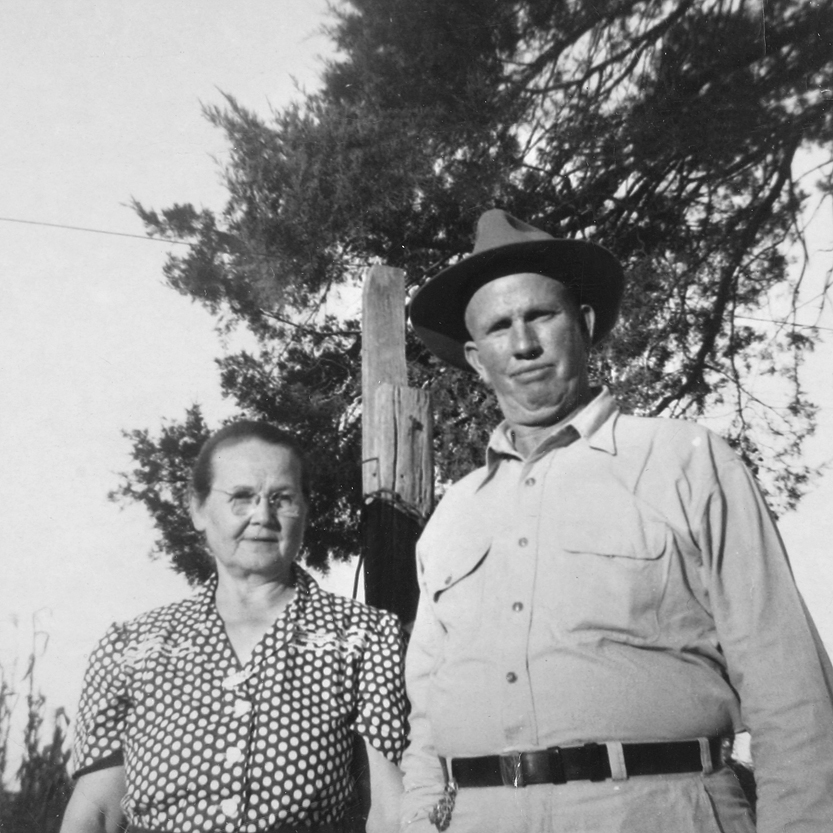 Millard Lee Hill
Millard Lee Hill- Born: Dec. 27, 1894 Johnston, NC
- Died: Sept. 16, 1956 Kenly, Johnston, NC
- Buried in Fred Hill Cemetery, Kenly, Johnston, NC
- Married Zilphia Stancil on Nov. 5, 1916

 Millard Lee Hill
Millard Lee Hill

|
| Millard’s children with Zilphia Stancil Hill |
|---|
| Vernon "Jim" Fletcher Hill March 10, 1917 Johnston, NC-Sept. 9 1973 Johnston, NC; Buried in Fred Hill Cemetery, Kenly, Johnston, NC |
| Mavis Cassandra Hill Godwin Nov. 12, 1918 Kenly, Johnston, NC-June 26, 2013 Wilson, NC; Buried in Evergreen Memorial Park, Wilson, NC |
| Hazel Hill Crocker Wright July 1, 1920 Johnston, NC-July 22, 2015 Middlesex, NC; Buried in Friendship Free Will Baptist Church Cemetery, Johnston, NC |
| Beatrice LaRue Hill Renfrow May 30, 1925 Johnston, NC-June 29, 2010 Norfolk, VA; Buried in Woodlawn Memorial Gardens Norfolk, VA |
| Virginia Eloise Hill Sidelinger March 9, 1929 Johnston, NC-Jan. 21, 2016 Wilson, NC |

Front: Bea, Hazel and Eloise; Back: Mavis, Millard, Zilphia and Jim.
Courtesy Stancil Reunion Archive
|
Millard, the fourth-oldest child of Fred and Tempy Ann Stancil Hill, was a good-looking man with a head full of thick, wavy black hair.
He began smoking at an early age, favoring Chesterfield cigarettes, whose slogan was “They do satisfy.” Millard liked to use a cigarette holder. He was just three months shy of his 15th birthday when his mother passed away.

|
Millard grew up working hard on the farm in O’Neal Township, Johnston County. He had two older sisters, Delia and Ronia, and an older brother, John Fletcher. Fletcher, being only 16 months older, was particularly close to Millard.
It seems that Millard always knew the Godfrey and Cassandra Stancil family, who were close neighbors in the Lower O’Neals portion of O’Neal Township. All the children attended the graded Boyette Slave House, which met higher educational standards than non-graded schools.
Godfrey was born in 1860, the son of Allen S. and Betsy Selivent Stancell. Allen, born in 1830, was the son of William and Milley Stancel of Johnston County. Cassandra was the daughter of George and Minni Moore. Godfrey and Cassandra were married on September 21, 1890, at Frank Moore’s place, with Justice of the Peace Kerney Eason officiating.
Cassandra died before June 1, 1900. The children listed in the 1900 Census were Annie (age 9), Edward (age 8), Charley (age 7), Frances (age 4), and Zilphia (age 1).
Godfrey, at 41, did not remain a widower for long. He married Hazel ‘Harriet’ Pittman on May 4, 1901, in Johnston County, NC. Harriet, only 23, immediately became stepmother to five children. Godfrey and Harriet had five children of their own: Sendey (born in 1904), Octavia (born in 1907), Rosetti (born in 1909), Marry (born in 1912), and George (born in 1915). All but Rosetti reached adulthood. The children attended Moore School House.
Tragedy struck the Godfrey family again in 1909 when 16-year-old Charley was killed. At the end of the day, Charley turned the mule into the pen, and the mule kicked him in the head, delivering a fatal blow.

Courtesy Stancil Reunion Archive |
Initially, Millard dated Frances, and Moses dated Zilphia. Frances, a high-strung woman, was difficult to live with. Once, Zilphia said to Millard, “I wish you had married Frances.” Millard replied, “You don’t wish your sister dead, do you?”
Justice of the Peace L.H. Boykin married Millard Lee Hill and Zilphia Stancil on November 5, 1916. The witnesses were Eddie Stancil, Moses Hill, and J.N. Boykin. Moses was Millard’s brother.
Millard and Zilphia moved into the house to look after Fred when they married. Arnettie, Fred’s second wife and sister of Tempy Ann (and aunt of Millard), had been dead for about three months. Fred suffered from TB.
After they moved out of Fred’s house, they moved into one of Ronia and Stephen Stancil’s tenant houses. It had one room. They spent their wedding night there, but the flying squirrels on the tin roof made such a racket that they soon moved to another place.
Millard provided information to the county when his father died. Fred’s parents were Moses and Affie.
The children of Fred and Arnettie were placed in a Masonic Orphanage in Raleigh.
In 1920, Millard bought a Model T, ending the need to travel to reunions in a double wagon pulled by two mules or in a buggy. They would stop and pick up Uncle Harvey and give him a ride to the reunion. Mavis recalled Harvey lifting her and Hazel down from the Model T, holding each in one hand. They wore pretty yellow dotted Swiss dresses trimmed in white lace, made by Zilphia. They brought ham, fried chicken, and a cake.
Zilphia cooked food when they visited the orphanage during the 1920s. Once, when Nancy was sick, they visited her in her room. Millard and Zilphia usually visited the children once or twice a year.
Millard bought the homeplace, paying Ronia, who was living there and wanted to move to Stephen’s land. Radford Bailey went with Millard, his brother-in-law, to get Arthur out. Arthur was going to stay with Millard and Zilphia.
Millard farmed tobacco and corn. He also raised red hogs, known for producing the best hams.
Millard had a cow who had a black calf and rejected it. He got in touch with Harvey, who came over and rubbed a cloth on the calf and then the cow. He kept this up, and finally, the cow accepted the calf. Harvey said that God gave him his veterinary talent and that’s why he didn’t charge for it.
Zilphia had dominiques chickens, which she liked best.
Millard had 25 geese; ducks were too messy. Geese were used to provide down for pillows and beds, and they weeded the fences in the cotton fields.
Millard had 100 pearl guineas, which ate small insects. Females say ‘buck wheat,’ while males make only one syllable sound. You can’t have bees or guineas together, as guineas will eat the bees. They also eat yellow jackets, etc.
Guineas and turkeys ate worms in the tobacco field. They slept in cedar trees in the winter, which was warmer, and in oak trees in the summer, which was cooler. Guinea eggs are very rich and yellow.
Millard had goats because he was told that they made other animals healthier. He did not eat them. The goats kept weeds off the fences.
Millard had a dog named ‘Bob,’ a good quail dog with a short tail. He once sold Bob to a man for $100, with the understanding that if Millard missed him, the dog would be returned. Millard missed the dog after a few days, so he was returned, and the man got his $100 back. Millard loaned Bob to Moses and Toni for hunting quail.
Folks grew herb gardens. When anyone was ill, neighborhood people carried over herbs to treat them.
On Sundays, Zilphia made chicken pastry and a special chocolate layer cake with fudge frosting. Zilphia had an herb garden.
Millard kept Wilbert and Arthur sometimes.
Zilphia named their daughter Virginia Eloise. Virginia was for Jack’s girlfriend, whom he thought he would never marry. They married shortly after Eloise was born. Zilphia was unhappy she named Eloise Virginia when Jack and Virginia could have had a daughter and named her Virginia.
When it stormed, the children stayed away from the windows and stayed real quiet. Millard would often walk out to the porch to take a look. When it looked like there was a drought and they needed rain, Millard would say, “Don’t worry, it will come in time.”
Millard played the organ and harmonica, performing songs like “Turkey in the Straw” and “Bill Bailey.” Mavis played the harmonica, and Millard danced. Zilphia didn’t dance, except for one time.
Zilphia said, “Always marry for love, not money.” Millard replied, “No indeed, marry for money and work for love.”
At night, Clarence, Tonie, and other men gathered at the store at Moore School House to play checkers and cards. Bob would go down to be with them. They had a good heater in the wintertime, and Bob liked it there. When the game ended, Clarence tied a bag with fresh coffee grounds in it to Bob’s tail. Bob carried the coffee home to Millard.
Millard and Zilphia hosted Hill Reunions when it got cool in the fall. One game played was Possum, where the girls were possums and the boys were dogs. The girls chased up in the trees. Once, a limb Mavis was on broke, and she fell. This knocked her out, and she was easily caught.
The girls and Jim also played baseball with the neighborhood children. All but Eloise played, as she was too young.
Zilphia, Millard’s wife, made a special coconut cake for the reunions.
Zilphia cracked black walnuts from their tree with an anvil and hammer, picked out the nut meat, and spread a white cotton sheet on the floor. All for her black walnut cake she made at Christmas time.
Zilphia laid a cotton sheet on the floor, had an anvil made from a railroad tie and a hammer, and cracked the walnuts from the tree in the yard, picking out the meat for her special cake.
At Christmas, Zilphia would cook a rooster and bake a ham. Millard made sure hogs were killed two weeks before Christmas so there would be fresh pork. She baked a black walnut cake with six layers and seven-minute frosting. Pearl made a similar cake.
Zilphia had two wooden butter molds. One had a star, and the other had a rose. Zilphia had a special bowl and paddles she used to work the liquid out of the butter. The kitchen was swept after every meal by one of the girls.
Bea’s job was to make the butter. She used a wooden churn with a wooden dasher that had to be rapidly raised up and down until the butter formed. In 1936, Millard bought a more modern churn that had gears to turn the dasher when the handle was turned.
One day after Raymond Hill, a nephew of Fred Hill, left Mavis, Harvey’s daughter, Raymond and Zeb Hill and three others visited Millard. Raymond said, “Can we have a drink of your good water because I remember it being good well water.”
Millard handed him the small gourd dipper Zilphia kept near the well. They all stayed at the well and talked for a long time.
About 1933, Millard made a cooler from a white enamel bucket with a lid. Millard fixed it so it could be let down in the well to keep the butter cool. Millard made another cooler for milk. Food left over from dinner was lowered into the well until supper time to keep it cool so it didn’t spoil.
In 1936, Millard bought an organ in Durham at an auction. When Eloise was 7 or 8, he taught her to play ‘Don’t Let Your Deal Go Down’.
In 1939, the house was wired for electricity. One day when Millard returned after dark, he told the children, “Now listen good, I did not put electricity in so you’d think it was daylight all the time.”
Before Millard died, he went to Washington DC, got Nancy, and took her to Smithfield to get her share of the money from Fred’s estate.
Millard was getting older and not feeling as well as he used to. He complained of excessive sweat and pain in his neck.
Millard had a stroke in late August 1956. He was concerned with the disease in his tobacco crop. He feared he would lose his home. As Zilphia was tying tobacco in the pack house on Sept. 18, 1956, Millard told Zilphia he had to go to the house. He shot himself at home with a gun and was dead by the time she arrived.
Grizzard Funeral Home in Kenly handled the service. Millard’s body was returned home for the wake. The funeral was at the funeral home. Millard was buried in the Hill Family Cemetery in Johnston County.
Nancy, Arnettie’s daughter, had always been very close to Millard and his family. She had a good job in Washington, D.C., and paid all of Millard’s debts.